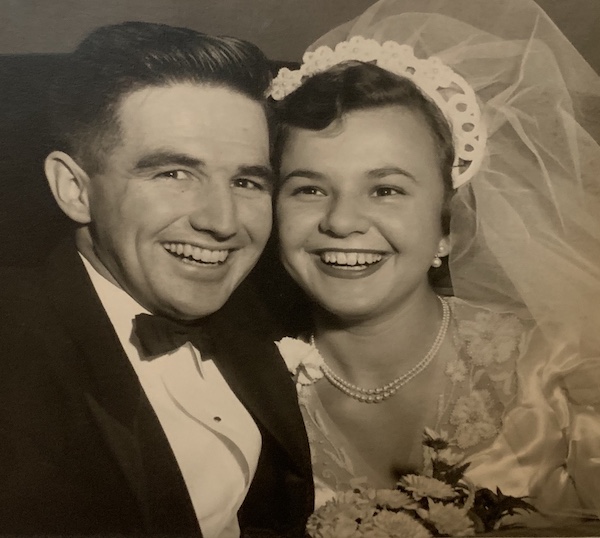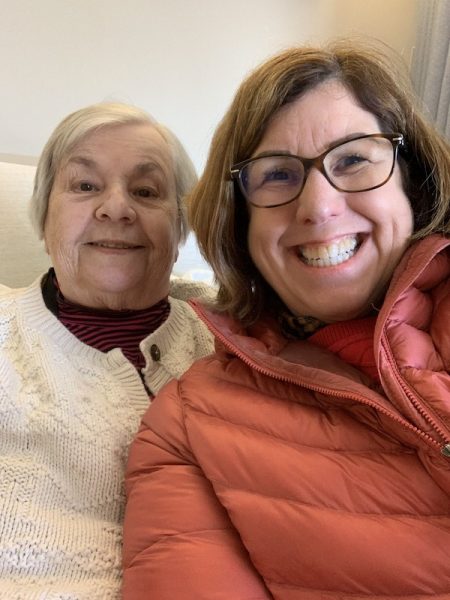A few weeks ago I got an email from my friend and colleague Nancy Marshall about her mother, who’s 87, and lives in an assisted living facility. During the past six months, she’s had several bad falls and has been in and out of the hospital and rehab. Smack dab in the middle of COVID. Nancy can only visit her once a week and when they are together, they are separated by a sheet of Plexiglass. “The last time I saw her she said she just wants a hug,” Nancy wrote. “Nothing else. Just a hug. From almost anyone, I think!”
A lot of people are struggling with similar experiences and feelings right now. And while some have figured out new ways to be connected, it’s difficult and sometimes impossible for others. And, nothing can replace a hug. I asked Nancy if she’d write an essay for us about how she is trying to cope with her situation. She said yes, and when she sent it to me she said writing it was cathartic. It’s a sad story, but it is also a beautiful tribute.
A story by Nancy Marshall about her mom, Martha W. Briggs (born 1933).
My mom, Martha, was always there for me. Now, it’s my turn to be there for her.
When I was growing up in Bethany, CT, she was the director of the town’s preschool during the school year and she taught swimming lessons at the town pond during the summer months. She had a full life as the mother of my two older brothers and me, as well as the wife of a corporate sales executive (my late father), and a teacher, volunteer, and friend to many. But I always knew that I was her priority. She was always there for me.
Whether I needed a ride home from my 4H club meeting, my church group meeting, or swim practice, I could count on her.
I learned later in life that when my mom was growing up in the 1930s and 1940s, she did not get the same attention from her own parents, and she sometimes did things that she wished she hadn’t. Because of this, she made it her mission to keep me busy doing “good things” like 4H, horseback riding lessons, swim team practice, church group, community service, babysitting, and a myriad of other activities that kept me engaged and off the streets.
As a pillar of our community in Connecticut and later as a volunteer in my kids’ schools in Kingfield and Carrabassett Valley, Maine, everyone loved my mom. Her nickname was “Oma” because of our family’s German heritage. Oma was and still is a word that kids and adults love to say. My mom has always embraced her “grandmotherliness” and has been an Oma to all. Even the teachers, the principal, and the janitor (who wore pink fuzzy slippers) at the Kingfield Elementary School called her that and loved when she came in to volunteer.
I think it was my mom’s selflessness and empathy to others that has always drawn people to her. She was always compassionate to animals as well, and when I had a horse and pet duck as a teenager, we would bring the duck and the horse in a horse trailer back and forth to our cottage on Damariscotta Lake in the summertime. She fearlessly drove a pickup truck dragging the horse trailer. I didn’t realize that there was anything to be afraid of in driving a big rig like that, but now when I back on it, I am amazed.
One year, my pet duck laid eggs that we suspected were fertile, and when we moved to Maine in the summer, my mother slept with them in her bed because the duck abandoned them. My mom didn’t want those chicks inside the eggs to die. I don’t think they hatched, but she gave it her all. That alone says so much about her.
Today, my mom is in a rehab hospital in Portland, after having had two bad falls at her assisted-living home during the COVID-19 pandemic. She hit her head back in March and had to go to the ER but was sent back to her assisted-living facility. Then, she fell again in August, hit her head, had bleeding on her brain, and had to spend a week at Maine Medical Center before going to a rehab hospital for intensive physical and cognitive therapy.
My mom suffers from depression and anxiety, and she feels safest when she is in bed. She says she is “resting.” However, she sleeps for much of the day and through the nights. She lives for the phone calls from my two brothers, her four grandchildren, and me. Because of COVID, I can only see her once a week, and that is with an appointment and physically distanced through a plexiglass screen.
At my appointment with her two weeks ago, my mom told me that all she really wanted was a hug. But because of COVID, I could not give her one. That just about killed me.
A hug. It’s such a simple thing. It’s the least I could do for the woman who was always there for me to hug me, console me, encourage me, and believe in me.
As we consider whether to move her back into her assisted-living home or advance her into nursing care, I often think about what a crime it is for someone as kind and caring as Oma to live out her days in quarantine without hugs. I cannot even hold her hand. She craves physical touch, and no one is touching her.
In the past four years, my mom has advanced from her own home, where she lived with my late father (he died in 2006 at the age of 79), to an independent cottage in a retirement community, and on to an independent apartment in the same community, where she suffered a serious stroke in 2017. Then, it was on to assisted living in that community until she fell and broke her tailbone in November of 2019. We moved her into nursing care and rehab until February of this year, when we moved her into assisted living just before COVID.
That’s when my mom had to stop going to the dining room for meals, which she loved because of the social contact with her “friends” who sat with her at the dining room table. On Friday, March 13th, they started bringing her a tray in her lonely apartment three times a day, so she could eat in front of the television. The Golden Girls, The Andy Griffith Show, and The Weather Channel were her only friends.
Then, she fell and hit her forehead and eye badly in August of this year. Now, she is in rehab and they want to move her into nursing care.
What kind of a way is that to live out a beautiful life? Alone, in quarantine, in isolation, with no human touch. I often think how cruel this pandemic is, particularly for people who may not have much longer on this Earth, and now to have to be quarantined away for fear of catching the virus.
And me? I feel guilty. I feel torn. I feel that I owe her whatever I can give her at this point in her life. It’s my turn to take care of her and show her how much I love her. I tell myself every day that if the shoe was on the other foot, and if she were capable, she would be there to take care of me. Now, it’s my turn.
And I can’t even give her a simple hug.
Nancy Marshall, aka The PR Maven, Marshall Communications
Thank you, Nancy. While it’s not the same, I’ve just sent your mother and you a couple more virtual hugs.
Do you have a story about coping with COVID that you’d like to share? Send me an email or write something in the comment section below.



Here is my comment after reading about Oma and Nancy. It is immoral and unethical, I believe, to be isolating these patients and residents. We need to do better. I have spoken wiith other professionals( social workers, nurses) and nobody feels that this is right. If kids are going back to school, then it is time for nursing home administrators and health professionals to rethink the policies. Something must change. And the powerless and voiceless can not fight for themselves.